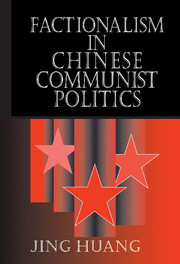Book contents
- Frontmatter
- Contents
- List of Figures and Tables
- Preface
- List of Abbreviations
- Introduction
- 1 Factionalism, the Puzzle of Chinese Communist Politics
- 2 Factionalism and the Political System in China
- 3 The Establishment of the Yan'an Round Table
- 4 The Transition of the Yan'an Round Table
- 5 Crises in Leadership Relations with the Two-Front Arrangement
- 6 The Collapse of the Yan'an Round Table and the Unleashing of Factionalism
- 7 Deng Xiaoping's Dominance: Factionalism Prevails over the Party Spirit
- 8 Conclusion
- Selected Bibliography
- Index
7 - Deng Xiaoping's Dominance: Factionalism Prevails over the Party Spirit
Published online by Cambridge University Press: 11 September 2009
- Frontmatter
- Contents
- List of Figures and Tables
- Preface
- List of Abbreviations
- Introduction
- 1 Factionalism, the Puzzle of Chinese Communist Politics
- 2 Factionalism and the Political System in China
- 3 The Establishment of the Yan'an Round Table
- 4 The Transition of the Yan'an Round Table
- 5 Crises in Leadership Relations with the Two-Front Arrangement
- 6 The Collapse of the Yan'an Round Table and the Unleashing of Factionalism
- 7 Deng Xiaoping's Dominance: Factionalism Prevails over the Party Spirit
- 8 Conclusion
- Selected Bibliography
- Index
Summary
THE ESTABLISHMENT OF DENG XIAOPING'S DOMINANCE
Deng Xiaoping's Comeback
The coalition of beneficiaries and survivors, led by Hua Guofeng and Ye Jianying, “smashed” the Gang of Four, which had little support from mountaintops except Shanghai, four weeks after Mao's death on September 9,1976. The new leadership was haunted immediately by Deng's case. Little evidence shows that the survivors abandoned Hua for Deng, as the official account implies. But their continuous support of Hua was half-minded, not only because they realized that Deng's return was inevitable, given his control of mountaintops in both the Party and military systems, but also because their own power rested essentially on the support from the veteran cadres and officers rather than those who rose to power during the CR. Allegedly, Ye Jianying sent his children for Deng “immediately” after the Gang of Four was arrested on October 6. Ye told Deng not only of the Gang's arrest but also the details about the Politburo conference on the aftermath. Li Xiannian also said to Hua privately a few days after the Gang's arrest that the verdict on the Tiananmen Incident in April 1976 “appeared shaky” (kao buzhu), hinting that Deng's verdict should be reconsidered because Deng was officially brought down by the allegation that he was behind the “anti-Party and anti-Mao” Tiananmen Incident.
- Type
- Chapter
- Information
- Factionalism in Chinese Communist Politics , pp. 350 - 410Publisher: Cambridge University PressPrint publication year: 2000

